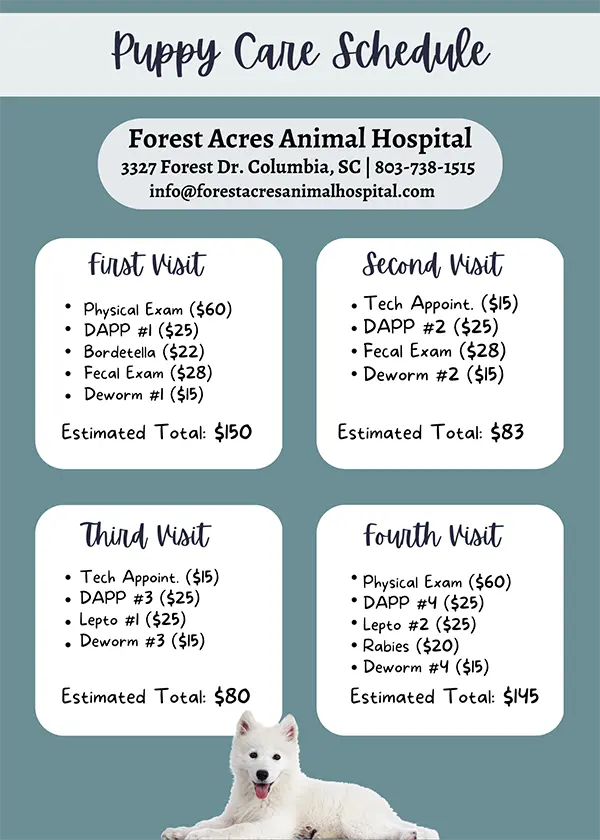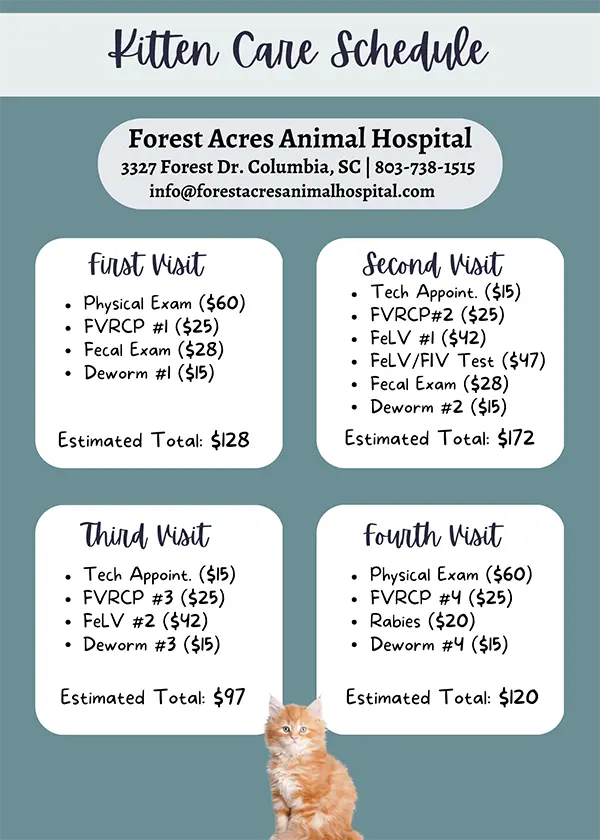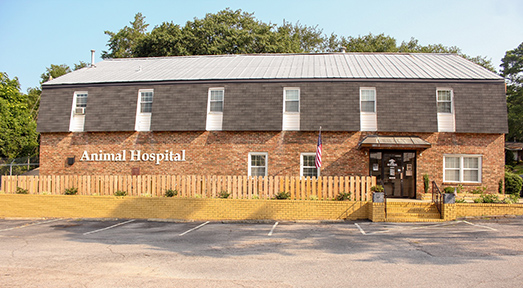Vaccinations
We typically recommend these types of vaccines and preventatives:
Dogs
- Distemper / Adenovirus / Parainfluenza / Parvovirus These diseases are not only common, but they also represent a serious threat to your dog's life. Most dogs will encounter these diseases at some point in their lives, making this vaccination extremely important. A combination vaccination for all four diseases is recommended every three years after the puppy boosters.
- Rabies This fatal viral disease affects all warm-blooded animals, posing a risk to humans as well as to dogs and cats. Puppies should receive their first Rabies vaccination between 12-16 weeks of age, with a booster administered at one year of age. Dogs should receive an additional vaccination every three years after the first year.
- Leptospirosis This is a bacterial infection that attacks the kidneys, and is transmitted through the urine of wild animals such as raccoons and rodents. Dogs may contract this disease through contaminated puddles or outdoor water bowls. Leptospirosis is becoming a more common disease and can present a serious threat to your pet's health. Dogs at risk of being exposed should be vaccinated annually.
- Bordetella Bronchiseptica This disease is commonly known as kennel cough. Symptoms include a dry hacking cough that may last six weeks or longer. This disease is caused by a highly contagious bacterium. Dogs are commonly exposed to the disease in boarding kennels, obedience schools, public dog parks, grooming facilities, and veterinary hospitals. Dogs at risk of exposure should be vaccinated yearly.
- Heartworm Mosquitoes are capable of transmitting heartworms, making exposure very likely, especially in South Carolina. Your dog's monthly heartworm prevention also protects him or her against intestinal parasites that can be transmitted to humans. Heartworms can cause heart and lung disease, which can be fatal. Puppies should begin heartworm medication at eight weeks of age and should continue monthly treatment for the rest of their lives. Heartworm medication also serves as a monthly parasite control.

Cats
- FVRCP This is a combination vaccination administered every two to three weeks between 8¬ and 16 weeks of age. Cats receive a booster at one year, with additional boosters every three years. This vaccine helps to safeguard your cat against three viral diseases: Rhinotracheitis, a herpes virus; Calici virus, which causes upper respiratory infection; and Panleukopenia, also known as distemper. These potentially fatal viruses are all easily transmitted between cats.
- Rabies This fatal disease affects cats in the same way it affects dogs and humans. The initial vaccination should be given at 12-16 weeks of age, with non-adjuvanted Purevax boosters administered annually. Some evidence shows that these one-year vaccines are less likely to cause tumors than adjuvanted three-year vaccines, therefore decreasing your cat's risk of developing sarcomas at the injection site.
- Feline Leukemia This is an often fatal viral disease that suppresses the normal functions of the feline immune system and inhibits an afflicted cat's ability to fight off disease and infection. Transmission typically occurs through grooming, sharing water bowls, breeding, fighting, and contact with saliva. It is recommended that cats receive the first vaccination at nine weeks with a booster at 12 weeks, and a booster once a year thereafter.

Treatment Area
Our treatment area has many uses. We perform all dental cleanings in this area, as well as attend to emergencies, perform treatments and drop-off examinations.
Dentistry
Good oral health is important to your pet's general health! Just as your dentist recommends routine dental cleanings to prevent disease of your teeth, it is also highly recommended for your pet to have routine dental exams and cleanings. According to the American Veterinary Dental College (AVDC), by the age of 3 years old, most pets will have some degree of periodontal disease.
Signs of oral and dental diseases in dogs and cats:- Bad breath.
- Loose teeth or teeth that are discolored or covered in tartar.
- Your pet shies away from you when you touch the mouth area.
- Drooling or dropping food from the mouth.
- Bleeding from the mouth.
- Loss of appetite or loss of weight (this combination can result from diseases of many organs, and early veterinary examination is important).
Most commonly, the only sign of periodontal disease that an owner recognizes is "bad breath". As a result, periodontal disease is often diagnosed late in the course of disease and may cause multiple problems in the oral cavity and may be associated with damage to internal organs in some patients as they age. Studies in humans have linked periodontal disease to a variety of health problems.
Because our pets can't tell us when their teeth hurt or when there is a problem, it is important that they have yearly dental exams. All of our routine exams include a dental exam. If our veterinarians notice periodontal disease or have concerns, it is important to do a complete dental exam under anesthesia. Similar to a human dentist, your pet's teeth will be probed and evaluated to check for periodontal pockets, gum erosion, root exposure, and fractures, which may lead to tooth extractions. Anesthesia is necessary for all dental cleanings and so-called "anesthesia-free" dental scaling is not recommended by AVDC. When our own teeth are cleaned, we calmly sit in the chair, open our mouth when requested, and know to spit excess fluid to prevent from choking. We also understand why the cleaning is important and rarely need sedation or restraint. This is not true for our pets. Additionally, we are able to tell the dentist which teeth or areas are painful. Our pets are not able to understand the exam and cleaning process and cannot communicate their aches and pains. For these reasons, it is important that proper anesthesia is performed so as not to miss anything and to protect the pet from inhaling fluid from the cleaning process.
When necessary, in-house digital x-rays can be taken and reviewed instantly. These images can be very useful to detect fractures, infected pockets or root abscesses, broken roots left below the surface of the gum line, amognst other things.
Statistics show that preventing diseases with regular dental checkups can extend your pet's life expectancy by two to four years.
Hospitalized Ward
When pets need hospitalization or continuous monitoring, they are kept in the wards adjacent to the treatment area where our technicians and doctors can see them at all times.
Laboratory
Our fully equipped in-house laboratory allows us to run blood, urine and fecal tests immediately, giving you an answer about your pet's health within minutes.
Euthanasias
The loss of a pet is a tragic and emotional time for any family. A dog or cat that is suffering from disease or injury may need euthanasia services. We will assess your pet’s situation and help you gain a thorough understanding of what your pet is experiencing. When euthanasia is required, we will work with you to help you say goodbye and be with your pet to the full level of your comfort.
Pet Comfort
Mild sedation will be administered to ease any discomfort your pet is experiencing. This gives you extra time to say goodbye to your pet while keeping your pet from suffering.
Humane Euthanasia
When it is time, we will administer the euthanasia medication that will allow your pet to gently fall asleep and peacefully pass.
After Care
If you desire a home burial for your pet, we will provide guidance on local regulations and guidelines and help with preparation for burial. If you desire cremation, we offer transportation for your pet to the crematorium.

